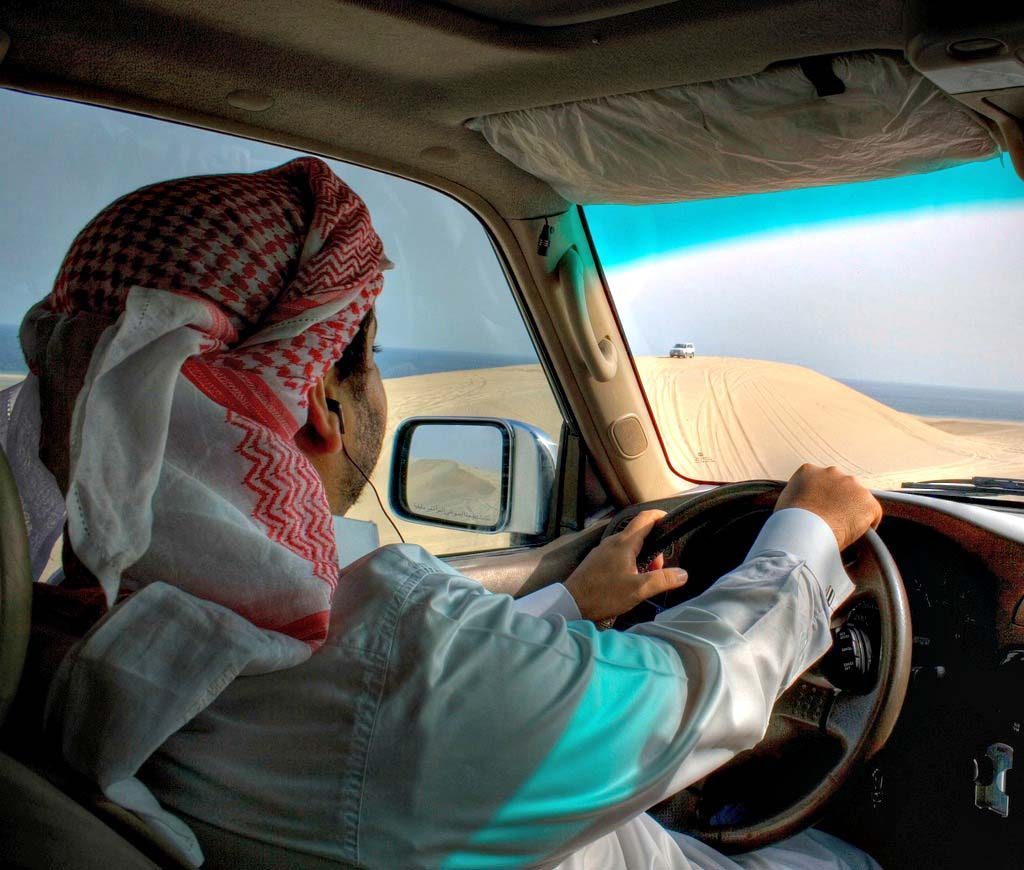
Stricter safety standards for those venturing into Qatar’s desert are in the works as local authorities move to improve the quality of the country’s tourism offerings.
The upcoming changes would affect drivers and vehicles, and were highlighted earlier this year by the Qatar Tourism Authority, as part of a plan to offer businesses incentives to establish new ventures.
The QTA wants to initially launch six new projects, one of which is a 4×4 leasing company that could rent out a fleet of vehicles to desert safari tour operators. Successful bidders would receive financial assistance and free marketing to help them get off the ground.
Changing regulations would also give these businesses an edge over existing companies, according to a QTA brochure:
“Regulations are expected to be enacted that will effectively ban private and unlicensed desert safari/dune driving unless the vehicle is suitably modified for the activities and the driver is adequately qualified.
This project therefore offers the investor the first mover’s advantage to provide a service that will guarantee revenue once the regulations are enacted and enforced, as current providers do not meet the requirements.”
New rules
The new regulations don’t necessarily spell an end to desert driving for individuals. An outright ban on the activity would be difficult to enforce and require the involvement of other agencies, such as the Ministry of Interior.

This, combined with QTA’s existing role in regulating the tourism sector through licensing private businesses, suggests the new rules are targeting desert safari guides and the 4×4 owners who contract their services to tour operators, rather than private recreational drivers.
Dune bashing and desert driving is a popular pastime in Qatar and many neighboring Gulf countries for tourists and residents alike.
Once dubbed “the graveyard of young men” by one Australian expat, the country’s vast expanse of sand dunes offer visitors an intense adrenaline rush, but the rapid ascents and descents carry significant risks with “accidents and near-misses commonly reported,” according to QTA.
While tourism officials have not responded to several requests for more information, the upcoming regulations appear to be focused on requiring vehicles to be outfitted with safety features such as roll bars, first aid kits, radio equipment and rigid “bull bars” attached to the front of the vehicle to protect its occupants.
QTA documents say “current (desert safari) options do not follow regulated safety standards,” but several operators say they would welcome the opportunity to upgrade their offerings.
Welcome change
Walid Al Jaouni, the CEO of Qatar International Adventures, said that unlike his counterparts in cities such as Dubai, tour operators in Qatar are effectively prevented from making many vehicle modifications – such as installing roll bars and specialized bumpers – by Traffic Department licensing requirements.
While he said he hoped that such rules would be harmonized with the incoming QTA requirements, Al Jaouni said the new measures would be a positive for his industry.
“If we are told, ‘No vehicles (in the desert) without safety bars,’ I would be happy. I know how important these things are,” he told Doha News. “It will improve our business if we can (improve) safety … We would welcome these ideas.”
His thoughts were echoed by Zarina Rajah, general manager of Arabian Adventures.
“It would be great … the security and safety of passengers is very important,” she said, adding she was still waiting for official details from QTA.
However, while Arabian Adventures and Qatar International Adventures have been in business for more than two decades, both maintain modest fleets of company-owned vehicles. This means the firms are heavily reliant on freelance drivers to meet demand during peak periods.
New regulations would directly affect these individuals with access to 4x4s such as Toyota Land Cruisers and Nissan Patrols. They would face restrictions that risk creating shortages of properly licensed drivers and vehicles for desert safari operators.
Driver supply
According to a document published by the Qatar Development Bank, which is helping QTA work with the private sector, desert safari drivers will soon have to hold certain credentials, namely:
- A valid driver’s license;
- An advanced overland drivers certification by a recognized instruction institute;
- A roll-over and simulation driver testing from a recognized institute;
- A valid first-aid certificate; and
- A valid tourist guide’s license
These added regulations would likely pose a problem for freelance drivers.
On a busy weekend, Al Jaouni said Qatar International Adventures can contract up an additional 80 vehicles and drivers, many of whom are looking to supplement their income and improve their English while having fun motoring around the desert.
He said many would be interested in obtaining additional training, but added that requirements should be structured in a way that accommodates freelance drivers.
Otherwise, “all the companies are going to be fighting for a (limited) number of cars and drivers,” making it challenging to serve the increasing number of tourists and residents interested in visiting the desert, he added.
Thoughts?







